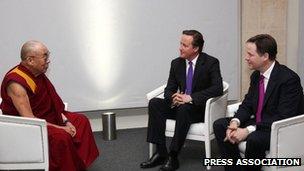David Cameron's Dalai Lama meeting sparks Chinese protest
- Published

David Cameron and Nick Clegg met the Dalai Lama at St Paul's Cathedral
David Cameron's decision to meet the Dalai Lama has provoked an angry response from the Chinese government.
The prime minister met the Tibetan spiritual leader in London on Monday.
China's foreign ministry said the meeting "seriously interfered with China's internal affairs" and "hurt" Chinese feelings.
Downing Street said the Dalai Lama was "an important religious figure" but the UK did not want to see its relationship with China "disrupted".
Mr Cameron and Deputy Prime Minister Nick Clegg met the Dalai Lama privately on Monday at St Paul's Cathedral.
'Moral crisis'
The exiled Tibetan spiritual leader was receiving the £1.1m Templeton Prize for his work affirming the spiritual dimension of life. He donated the bulk of the prize to Save the Children to support its work in India.
He told reporters China was beset by a "moral crisis" with widespread corruption and lawlessness.
Britain's ambassador in Beijing, Sebastian Wood, was summoned to China's foreign ministry by Vice Foreign Minister Song Tao following the meeting.
China's Foreign Ministry said Mr Song told Mr Wood British leaders should consider the "serious consequences" of meeting the Dalai Lama.
The meeting "seriously interfered with China's internal affairs, undermined China's core interests, and hurt the feelings of the Chinese people", said the foreign ministry in a statement.
'Concrete action'
At a news conference in Beijing, foreign ministry spokesman Hong Lei said: "We ask the British side to take the Chinese side's solemn stance seriously, stop indulging and supporting 'Tibet independence' anti-China forces, immediately take effective measures to undo the adverse effect, and take concrete action to safeguard the overall development of China-UK relations."
Mr Cameron's official spokesman defended his decision to meet the Dalai Lama, saying: "The Dalai Lama travels all over the world and has visited the UK several times in the past, and I believe that former prime ministers also met with him when they were in office."
The Dalai Lama, the spiritual head of Tibetan Buddhism, fled his homeland in 1959 after a failed uprising against Chinese rule.
He now lives in Dharamsala in India, travelling the world to seek support for more rights for Tibetan people.
He is regularly vilified by the Chinese government, which accuses him of trying to split Tibet, with its separate culture and language, from the rest of China.
- Published4 October 2011
- Published14 May 2012